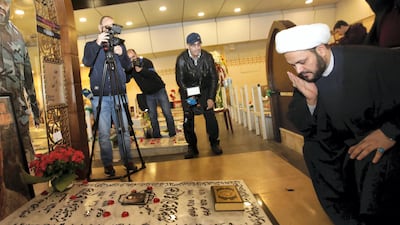The United States has announced sanctions on the hardline Iraqi Shiite militia Harakat Hezbollah Al Nujaba and its leader Akram Kaabi, the Treasury Department has announced.
The Iranian linked force has been heavily involved in the neighbouring conflict in Syria but is also a major partner of Tehran in Iraq.
The announcement late on Tuesday comes amid growing US concern about both Nujaba and other Iranian proxy forces in the Middle East. Kaabi, a cleric, was sanctioned by the US Treasury in 2008 for threatening the peace and stability of Iraq.
In September Republican Senators introduced the Iranian Proxies Terrorist Sanctions Act targeting it and another group. Four months later, a bipartisan group in the House of Representatives introduced a similar legislation.
The group, reportedly commanding some 10,000 fighters and tied at the top to the Iranian Revolutionary Guard Corps, is perhaps the leading network of recruiters for foreign fighters in Syria says Phillip Smyth, the Soref Fellow at the US-based Washington Institute who works on Shiite militarism.
Kaabi has been operating in Shiite militias in Iraq for years, with links to the Mahdi Army – a militant group formed by Muqtada Al Sadr to fight against the US invasion in 2003 – and he is vocal about his links not only Iran’s IRGC but also to Lebanon’s Hezbollah as well as numerous other proxy forces.
Nujaba started funneling fighters into Syria in 2012 and 2013, shortly after the popular uprising in the country descended into a bloody civil war. Mr Smyth describes their rapid rise as a pioneer of online recruitment for foreign fighters that quickly made them a pre-eminent organisation “leading the charge”.
The group’s place was further solidified after ISIS overran large parts of Iraq in 2014 and Iraq welcomed support from local Iranian and Shiite militias, known as Hashd Al Shaabi or Popular Mobilisation Forces (PMF), in battling the militants.
“Because they were already mobilised and kind of sending a lot of guys to Syria, they already had a large body of people they could call back up and people they could reprocess out,” says Mr Smyth. But, he says, the group maintained a focus on its Syria operations.
They also joined the PMF, which were later incorporated into the Iraqi security forces.
Mr Smyth points out that they have remained a purely military force – unlike other groups they have no parliamentarians or ministers – and as such, the US designation is “low hanging fruit” that is in line with the White House’s increase in pressure on Iran.
He described the US view of the move as: “They are a bad group, they’ve done a lot of bad things, they’ve pushed against our policy and this doesn’t create the complications in Baghdad.”
While sanctions on militant groups that largely operate outside traditional international banking systems can have limited impact, the symbolic ramification can be more important especially among America's allies.
The move sends the message that the US will maintain pressure on Iran and its forces around the region.
“There is a kind of multi-layered approach to how these guys live within the [Iraqi] political system, military system and regional political system,” says Mr Smyth. “I think the move is markedly more symbolic, although it does have teeth to it.”


